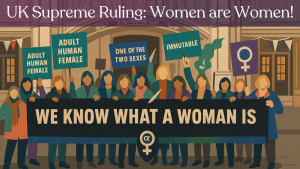
On April 16, 2025, the UK Supreme Court delivered a unanimous ruling that the legal definition of a “woman” under the Equality Act 2010 refers solely to biological females. This landmark judgment, stemming from a dispute between campaigners and the Scottish Government, has far-reaching implications for single-sex spaces, “transgender” rights, and legal clarity in the UK. Below, we explore the details of the ruling, its background, and its potential impact, with insights drawn from credible sources.
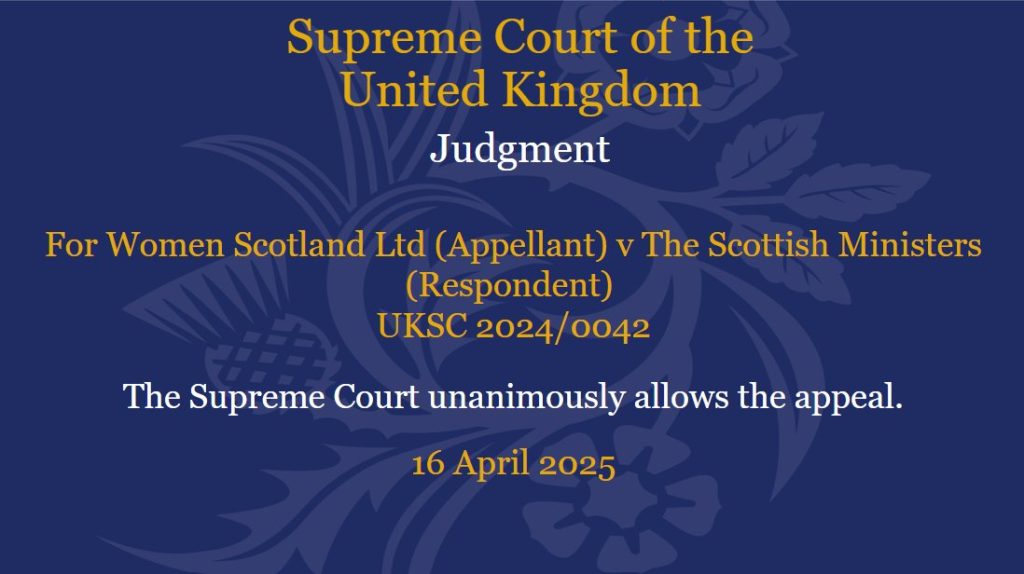
The case originated from a challenge by the campaign group For Women Scotland against the Scottish Government’s interpretation of the Equality Act 2010. The dispute centred on whether “transgender” women(men), who were born male but “identify as female”, should be legally recognised as women under the Act. The Scottish Government argued for a broader interpretation that could include “transgender” women(men), while For Women Scotland maintained that the term “woman” should be tied to biological sex.
The Supreme Court’s ruling clarifies that the definition of “sex” in the Equality Act refers to biological sex, explicitly stating that a “woman” is a person born female. Its decision states what the law has always been, not what it should be from date of judgment onwards. This decision resolves years of cultural and legal ambiguity and sets a clear precedent for how single-sex spaces and services are protected under UK law, and how they always have been!
The ruling addresses a contentious issue in the ongoing debate over the protection of women’s spaces. Keywords like “Supreme Court woman definition,” “biological sex ruling,” and “Equality Act 2010” have surged in search trends, reflecting public interest in the decision. The judgment provides clarity for policymakers, organisations, and individuals navigating the complex intersection of sex-based rights and so-called “gender identity”.
The Supreme Court’s unanimous decision, announced on April 16, 2025, emphasised that the term “woman” in the Equality Act is rooted in biological reality. The justices rejected arguments that the definition should extend to “transgender” women(men), stating that biological sex is the determining factor for legal protections under the Act. This ruling directly impacts how single-sex spaces—such as women’s shelters, prisons, and sports—are regulated, ensuring they remain exclusive to biological females where necessary. It has implications for concluded cases, cases currently being fought, employers’ “trans” access policies and more.
The court’s decision was informed by a careful examination of the Equality Act’s original intent, which prioritises protections based on biological sex to address historical inequalities faced by women. The ruling does not negate specific “transgender” rights, under the protected characteristic of “Gender Reassignment”, but clarifies that sex-based protections are distinct from “gender identity”.
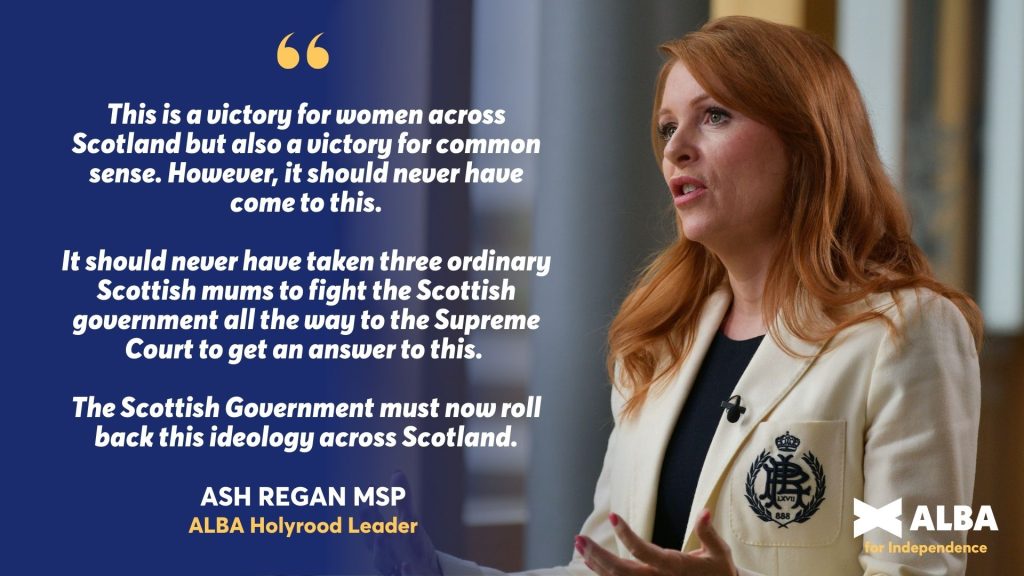
One of the most significant outcomes of the ruling is its impact on single-sex spaces. Campaigners argued that allowing men, however they identify to access to spaces like women’s bathrooms, domestic violence shelters, or sports could undermine the safety and privacy of biological females. The Supreme Court’s decision ensures that organisations can legally prioritise biological sex when designing policies for these spaces. The law was already explicit on protecting sex-based spaces, this just clarifies that sex means biological sex only, and not a certificated fictional sex based on a Gender Recognition Certificate.
This aspect of the ruling has sparked both celebration and debate. Supporters, including For Women Scotland, Lawyers and common sense advocates hailed it as a victory for women’s rights and sex-based rights. Critics argue it could marginalise individuals who desire to be “seen as the opposite sex”. Search terms like “transgender access single-sex spaces” and “UK women’s rights ruling” are trending, indicating the public’s divided sentiment, though for reality and the majority it is a huge win!
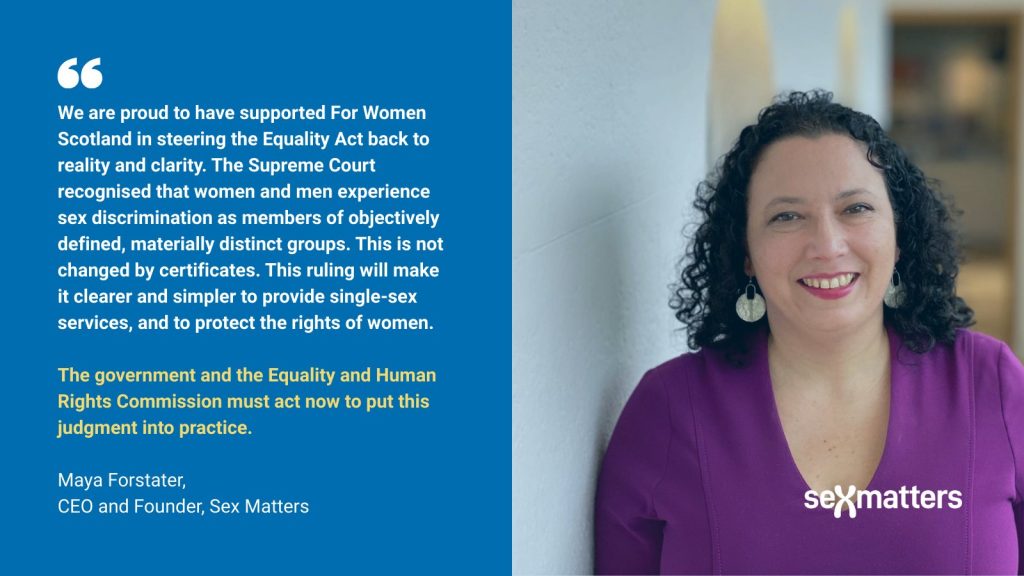
The ruling has elicited strong reactions across social and political spheres. On X, posts celebrated the decision as a “win for sanity” and a return to “biological reality.” Users praised the Supreme Court for providing clarity, with some noting that politicians can no longer dodge questions about the definition of a woman. For example, one user remarked, “The next time a politician is asked to ‘define what a woman is,’ at least they’ll know the answer now.”
Conversely, “transgender” advocacy groups expressed concern that the ruling could lead to what they claim to be exclusionary policies. Politicians, particularly those in the Scottish Government, now face the challenge of aligning policies with the court’s decision while addressing all sides.
The campaign group For Women Scotland played a pivotal role in bringing the case to the Supreme Court. Their advocacy emphasised the need to protect women’s rights based on biological sex, particularly in contexts where safety and fairness are paramount. The group’s efforts were widely acknowledged, with one X post stating, “We would not be here without the excellent work of @ForWomenScot.” Their persistence has reshaped the legal landscape, making them a key player in this debate.
The Supreme Court’s ruling sets a binding precedent for how the Equality Act is interpreted across the UK. It affects not only Scotland but also England, Wales, and Northern Ireland, where similar questions about sex-based rights have arisen. Organisations providing single-sex services, such as gyms, hospitals, and prisons, will need to review their policies to ensure compliance with the ruling.
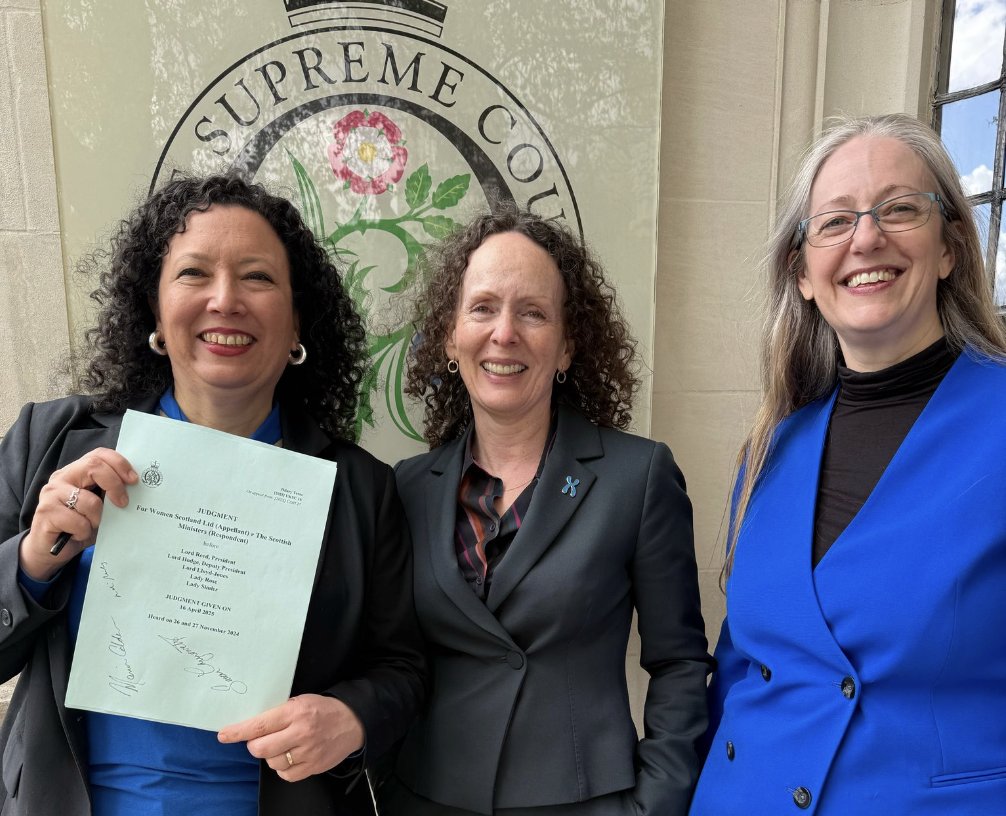
Additionally, the decision may influence ongoing debates about gender recognition laws, particularly the Gender Recognition Act 2004. While the ruling does not directly address self-identification, it reinforces the legal distinction between sex and gender identity, shaping future reforms. Search queries like “UK gender recognition laws” and “Equality Act Supreme Court” are likely to see increased traffic as policymakers and the public grapple with these issues. Though in 2022 the Conservative government clarified that following the results of a consultation, responses showed 81% agreed with the intention for separate single-sex toilet facilities. The new requirements will mean everyone can access appropriate facilities either through a separate single-sex space or a self-contained, universal toilet.
The ruling provides clear guidance for policymakers and organisations implementing the EA 2010, particularly in areas involving sex-based rights. It addresses public concerns about the erosion of women’s protections, as highlighted by campaign groups like For Women Scotland. https://murrayblackburnmackenzie.org/2025/04/16/statement-on-for-women-scotlands-win-in-the-supreme-court/[](https://www.supremecourt.uk/cases/press-summary/uksc-2024-0042)
The UK’s ruling comes amid global debates about sex and gender. Countries like the United States, Canada, and Australia have faced similar legal and social conflicts over “transgender” inclusion in single-sex spaces. The UK’s decision may influence international jurisprudence, particularly in nations with similar legal frameworks. For instance, searches for “global transgender rights” and “biological sex laws” are gaining traction as observers compare the UK’s approach to other jurisdictions.
The Supreme Court’s ruling is a turning point, but it is unlikely to end the debate over sex and gender in the UK. Policymakers will need to balance the court’s emphasis on biological sex with the rights of “transgender” individuals to non-discrimination. Legal experts anticipate further challenges as organisations implement the ruling. To stay informed, individuals can follow updates from credible sources.
For those seeking to explore the topic further, relevant keywords include:
Monitoring platforms like X for real-time reactions and checking reputable news outlets will provide a comprehensive view of the evolving debate. Additionally, resources like the official Supreme Court judgment or analyses from legal experts can offer deeper insights.
The UK Supreme Court’s ruling on April 16, 2025, that a “woman” refers to a biological female under the Equality Act 2010 is a defining moment in the ongoing debate over sex and gender. By prioritising biological sex, the decision provides legal clarity for single-sex spaces. As the UK navigates the implications, this ruling will shape policy, spark further discussion, and influence global perspectives on sex-based rights. “The general ruling that there is no need for legislation to disapply the Gender Recognition Act 2004 expressly is also significant. It will therefore also now be important to consider carefully the implications of the judgment for legislation other than the Equality Act.” (Murray, Blackburn, Mackenzie)

Read more articles here: https://tupatriots.org/news-articles
© The Uncensored Patriots - 2025. All rights reserved. Web design and maintenance by Consiliuma. Articles by TUP Community Members.